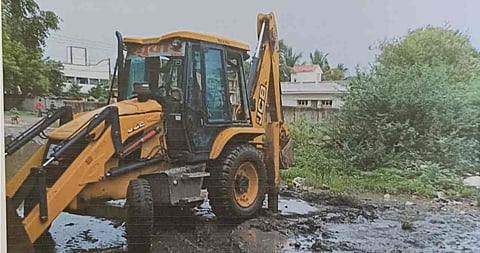
New Delhi/Amreli – In a significant victory for caste-based justice and civic accountability, the persistent sewage diversion crisis plaguing the Scheduled Caste (SC) locality in Jaswantgadh village, Amreli district, Gujarat, has finally seen concrete steps toward resolution.
This breakthrough comes as a direct result of report by The Mooknayak, amplified by the advocacy of a BJP activist, and escalated through intervention by the National Commission for Scheduled Castes (NCSC). What began as a stark expose of "sanitation apartheid" – where upper-caste households deliberately channeled household waste into Dalit neighborhoods – has culminated in immediate cleanup efforts and plans for a permanent underground drainage system, marking a triumph for marginalized voices in rural India.
The issue first gained national spotlight on June 25, when The Mooknayak, published an in-depth report on the issue. Drawing from local accounts, the report revealed how upper-caste residents in the village had illegally modified their underground drainage systems to redirect sewage and household waste into an open monsoon drain adjacent to Dr. Ambedkar Colony – a predominantly SC settlement.
Residents described the area as a "permanent swamp of humiliation," with fecal matter and debris flooding homes during rains, leading to severe health hazards. The proximity of an Anganwadi center to the contaminated drain raised alarms about long-term developmental risks for children, including exposure to waterborne diseases. Local health workers reported unprecedented mosquito infestations and a spike in illnesses, despite repeated complaints to authorities like the Gram Panchayat, Taluka Panchayat, and District Administration.
The crisis was initially documented by local media outlet Khabarantar, but The Mooknayak's national reach brought it to the forefront, framing it not just as a drainage failure but as a calculated form of caste oppression. Social activist Kirit Rathod, who provided photographic evidence and testimonies,said, "This isn't poor infrastructure; it's untouchability enforced through sewage. Upper castes are using waste as a weapon to reinforce social hierarchies."
The report's impact was immediate and far-reaching. T. Immanuvel Dinakaran, a former State Co-Incharge of the BJP Tamil Nadu Minority Morcha and a vocal advocate for minority and SC rights, filed a petition with the NCSC shortly after the publication. Dinakaran, leveraging his political influence and commitment to social justice, pursued the matter relentlessly, emphasizing the need for swift intervention in what he termed a "blatant violation of constitutional safeguards for Dalits."
His petition detailed the systemic neglect and caste-based discrimination, urging the NCSC to invoke its powers under Article 338 of the Constitution. "This is not just about sanitation; it's about dignity and equality," Dinakaran stated in his submission. His involvement bridged party lines, highlighting how caste issues transcend political affiliations and underscoring the BJP's stated commitment to SC welfare.
Just two weeks after The Mooknayak's report – the NCSC launched a formal investigation. The commission issued notices to key officials: the Amreli District Collector, District Development Officer (DDO), and Gujarat's Scheduled Caste Welfare Department. Demanding a comprehensive Action Taken Report (ATR) within 15 days, the NCSC warned of potential summons and stricter measures for non-compliance.
The NCSC's letter, referenced as No. ESDW/BE/GJ/2025/300700 and dated July 7, specifically addressed the "diversion of sewage water into Dalit settlements," echoing the details from The Mooknayak's expose. This marked a critical escalation, transforming a local grievance into a national constitutional matter and pressuring local authorities to act.
In response to the NCSC's directive, the District Panchayat Office in Amreli submitted an ATR on August 2 (No. PNC/8/Mis/Jashwantgadh/1012-1015/2025). The letter, addressed to the NCSC's Deputy Director in Ahmedabad, acknowledged the open drainage system's inadequacy, exacerbated by heavy rainfall that led to waste accumulation and sanitation concerns in the SC locality.
Immediate action included deploying a JCB machine for thorough cleaning by the Gram Panchayat, with photographic evidence enclosed to verify the work. More importantly, the report outlined a permanent resolution: the construction of an underground drainage system in the SC area. Funded under the 15th Finance Commission (Rural Component) and supplemented by a 10% District-level Finance Commission grant, the project has already secured necessary resolutions from the Gram Panchayat.
"We have cleaned the area and are committed to a lasting solution," the letter stated, requesting the NCSC to note the progress. As of August 24, 2025, local sources confirm that the cleanup has alleviated immediate hazards, and preparatory work for the underground system is underway, with completion expected in the coming months.
You can also join our WhatsApp group to get premium and selected news of The Mooknayak on WhatsApp. Click here to join the WhatsApp group.